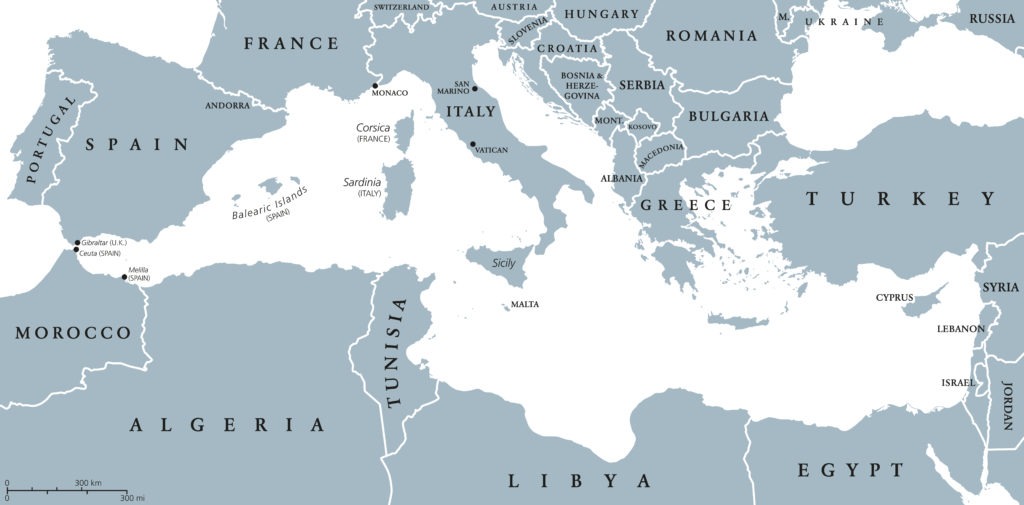Gianandrea Galiani interviewed by Daniel Moscardi
Gianandrea Gaiani is the director of the highly respected online magazine analisidifesa.it and an expert on immigration. He is a regular contributor to a number of Italian newspapers and appears frequently on numerous TV channels as an on immigration and security topics. He’s also the author (together with Giancarlo Blangiardo and Giuseppe Valditara) of the recent book (in Italian) Immigrazione, tutto quello che dovremmo sapere (Immigration. All you need to know about”).
Gefira asked Gianandrea Gaiani in an exclusive interview about his views on the latest developments in the arrivals from Libya and Tunisia and the current approach of the Italian government. Outspoken and anything but politically correct, Gaiani hits the spot about the recent change of policy of the Italian government on the NGO’s code of conduct as well as Italy’s achievements and (so called) “partners” in Libya.
GE: What caused last summer’s change of course by the Italian government and its approach toward the NGOs and the arrivals from Libya in general?
GG: The answer is quite simple. The disaster for the PD (Partito Democratico), leader of the current government, at the June administrative elections, sounded an alarm, showing clearly that when it comes to immigration, many center-left voters steer clearly to the right. A swift change of course was badly needed, with the obvious intent of reassuring disenchanted and alarmed Italians that the government was in charge of the situation.
GE: The numbers show that the arrivals have diminished significantly but that’s just that. We are still very far from the pre-2011 numbers.
GG: That’s because the government, on the other side, has to keep being complacent to the industry of immigration. It’s a network that profits – and thrives – on new arrivals, and this network galaxy is NOT happy if the arrivals complete stop. And their votes are also badly needed by the current government.
GE: A network made of?
GG: NGOs, Pro-migrants cooperatives, all the businesses catering to the migrants and last, but certainly not least, the ubiquitous Caritas and other Catholic Church’s organisations. We are talking about a huge pie made of billions of euro, and everybody wants a piece.
GE: What is the current situation in Libya?
GG: The coastal city of Sabratha was the theater of war between different militias for about two weeks in September. This has been hardly covered by mainstream media but we have reports that the two groups which are now in control of the city have received “counseling” from units of the French Army. The two militias are Ghorfat Amaliyet and the Wadi Brigade, and they are opposing the militia groups that were operating on behalf of Al-Sarraj, who had implemented a cooperation partnership with Italy. Italy was committed to financial help for villages and municipalities of the area under control of Al-Sarraj, but not military aid to armed groups of any kind.
Reportedly, upon seizing full control of the city, the militias discovered approximately 7.000 migrants packed in various buildings throughout the city. It is unclear whether the militias now in control will let them leave Libya towards Italy or they will relocate them somewhere else. The problem is, in my opinion, when you have the French and the British in the middle of operations like these.
GE: What do you mean by that?
GG: What I mean is that the French and the British are officially our “partners” but in reality they are acting very much against Italy’s interests in Libya. In fact, let me say, quite openly, that France and the UK are currently our worst enemies in Libya.
GE: Why?
GG: They simply will continue to operate, covertly or not so covertly, in order to make sure that Italy doesn’t have a leading role in Libya. It’s as simple as that. After all, the UK, France and the US knew all too well that the removal of Qaddafi in 2011 was a direct blow to Italy’s numerous interests in Libya, given the strengthened that the Italian government had under Berlusconi.

GE: How coincidental, shall we add, the recent malicious articles by Le Monde and the Financial Times, showing all this “humanitarian concern” about the migrants’ conditions in Libya who are now “held at bay” by (supposedly) Italian-paid militias…
GG: Let’s be pragmatic. In a situation like Libya right now you either send troops, which I see it quite unlikely, or you simply negotiate with those in control, regardless of who they are. If those in control are not exactly paladins of human rights, so be it. That is what any sovereign country concerned about its borders should do. As soon as Italy tries to regain (some) control of the situation, critics full of over zealous – and quite hypocritical – concern about the migrants “shameful conditions” in Libya appear overnight, ready to point their fingers at Italy as the culprit.
GE: Can you tell us more about the recent agreement signed between Italy and Niger?
GG: Niger – one of the poorest countries in the world – has asked Italy for logistic help in order to be more effective in patrolling its borders and eventually reduce the flow of sub-Saharans toward Libya. It is certainly a positive move but one that will hardly make a substantial difference overall.
GE: Why?
GG: Because the only effective move in order to really make a difference in order to significantly reduce the arrivals is to bring them back to the starting point. If they have to pay even more money to get back at sea towards Italy, with the risk of being deported again, they will start thinking: “is this worth it”?
GE: How do you do that?
GG: Given the absolute fact that practically 100% of those landing in Italy are illegal aliens as they are NOT running away from wars and political persecutions, the Geneva convention clearly states that NO country has the duty nor the obligation to welcome and give assistance to immigrants who pay criminal organizations to cross several borders. Now, it is a duty and an obligation to rescue human beings in a situation of distress at sea. That’s maritime law and the Italian Navy alone is perfectly capable of fulfilling that task without any phony “humanitarian” help from these NGOs that are there to fulfil “somebody else’s” agenda, certainly not on behalf of the Italian people.
But, once rescued at sea, these people must be brought back to the departing country. Now, this can be implemented as easily and as safely as possible. If the conditions of the “migrants” in that country of departure are not optimal for human rights or for their comforts, in that case we have an effective tool to curb this trend. People will start going home, especially given the fact that most of them are anything but poor – for African standards – and that no one is threatening their lives at home.
GE: The final question is – given the ongoing debate in Italy – about the Ius Soli law, that is the law that would grant immediate citizenship to many new immigrants.
GG: That is going to be the final blow to our society as we know it today. Those who are in favour of this law are quite careful in not mentioning the alarming situation in western EU countries. They don’t tell the general public that from France to Sweden, not to mention other countries, there are areas, so called no-go zones, that are practically off-limits to local law enforcement agencies, as the local Muslim communities have declared those areas under their control. We still don’t have that in Italy. Everybody knows by now that the left in Italy is pushing hard for this law because they think that, once naturalized, an immigrant will vote for those parties that granted him or her the citizenship. But with these hopes they are naive, or stupid at the same time.
GE: Why do you say that?
GG: Because as soon as they are citizens they will form an Islamic party, with all the related consequences. Now a foreign national suspected of ties or sympathies to terror groups can be deported from Italy, even if he or she are here legally. When they become Italian citizens where will they be deported to? The core of the problem lies in the massive brainwashing we have been subject to in western Europe about “multicultural societies”. Muslims are not interested the least in “multiculturalism”. They want their model, their values, in short their society to prevail and impose itself on the others. When the average Italian realizes this, it will be too late.
GE: Any message of hope at the end of this interview?
GG: I entertain hopes from Mitteleuropa’s countries like Hungary, Slovakia, Czechia and now Austria. They are defending their societies, their citizens, their values from this induced brainwashing that has already overwhelmed us in Western Europe. In fact, at present they are the last defence of our civilisation. I just hope they – in fact all the Visegrad group countries – will resist the incredible pressure from external forces.




